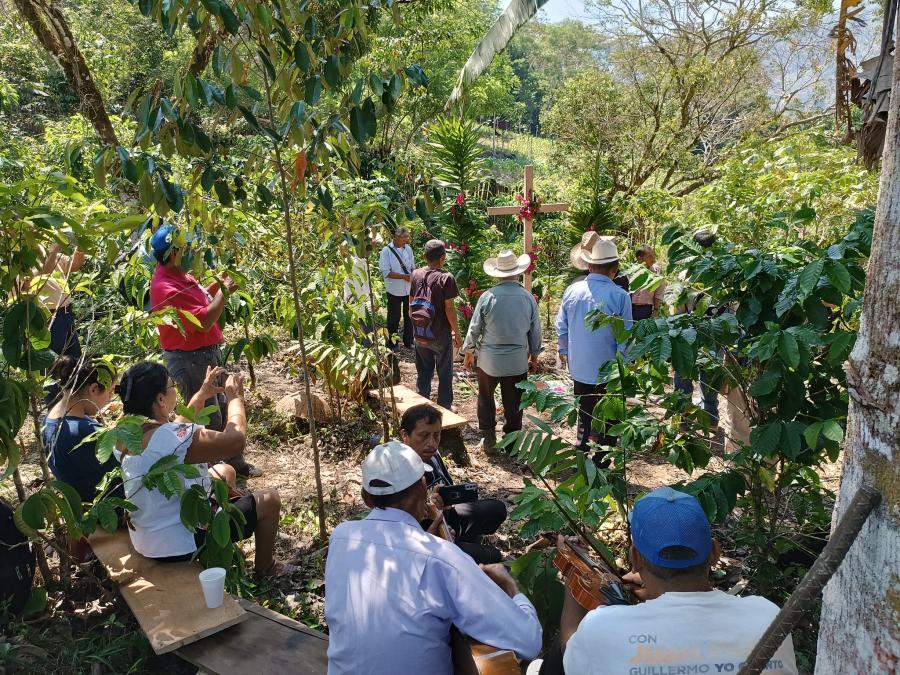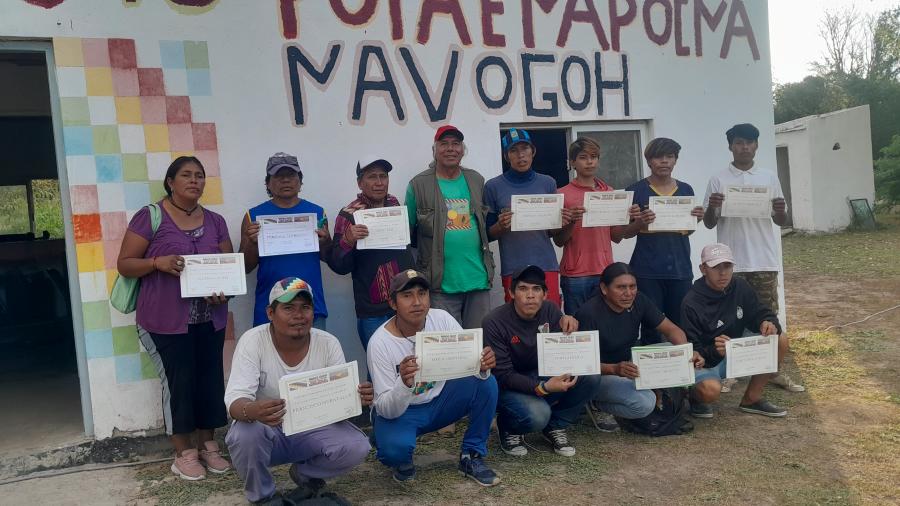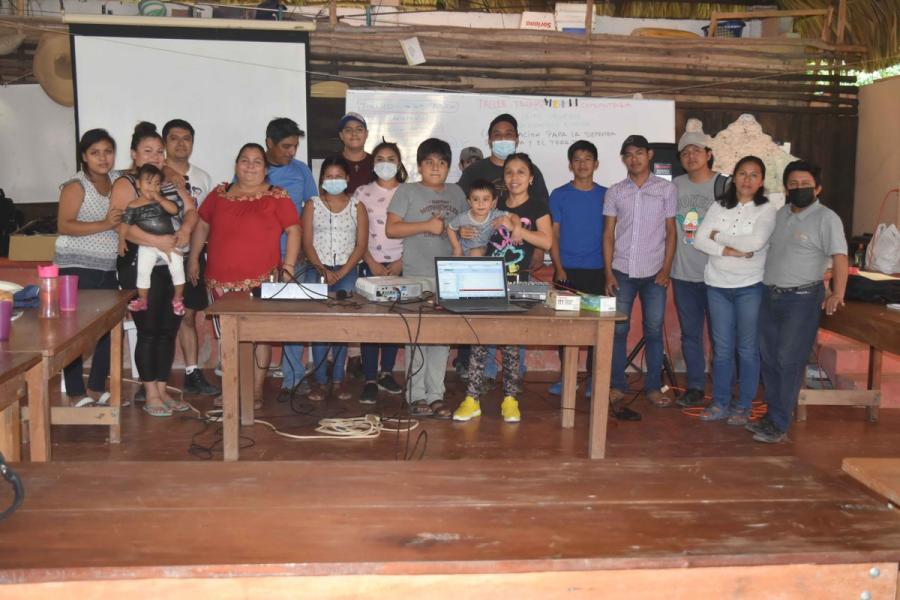Indigenous Women's Participation in Formulating the San Andrés Accords
In the preparation of the Accords on Indigenous Rights and Culture, indigenous women participated in broadening the notion of indigenous autonomy and made specific demands about what kind of political culture they understand the notion of autonomy to include. In the process of trying to influence the content of the San Andrés peace accords, indigenous women were speaking to both the State and to the larger indigenous autonomy movement. Inclusion in the national debate has represented a change in the political strategies used by women. In the past, they participated more often in marches and smaller local and regional meetings. When they began trying to influence the process of the peace accords, women began participating in a legal struggle by discussing constitutional changes and applying political pressure on the State.
In relation to the State, women are demanding to have the right to receive land in agrarian distribution, to get loans, and to receive support for commercial activities. They want respectful treatment from the medical institutions of the State and reject forced birth control programs. In relation to their communities, families, and organizations, they are demanding the right to choose who to marry, to inherit land, to hold positions of authority within the community, and to live a life free from sexual and domestic violence.
The most contentious issue for women in relation to the wording of the peace accords was the meaning of the terms "usos y costumbres." While one of the central points of proposals for autonomy was to have indigenous systems of justice and political decision-making respected, some of the "traditions" included under the loose terminology of "usos and costumbres" may not promote gender equity. Women's notions of tradition are not static and they are not searching for millennial roots. In different documents related to the peace accords, indigenous women have pointed out the need to change those customs and traditions that deny women their rights.
There should be documents in which we indigenous women note that there are customs which do not respect us and which we want changed. We are against violence, attacks, and rape. It is not right that we are sold for money. These were our customs before, but we have also got to change. It is also unfair that because of custom we cannot be community authorities or have rights to land (Memoria del encuentro-taller los derechos 1994)
The official indigenous movement linked to the government as well as the independent indigenous movement, have both operated using the dichotomous opposition of tradition and modernity. Indigenous women participating in the process of writing the accords put this dichotomy to the test. Indigenous women assert their rights to maintain cultural differences, while at the same time, demanding the right to change those traditions that oppress and exclude them.
We also have to think about what has to be changed in our customs. The law should only protect the customs and traditions that the women, communities and organizations deem as good. The customs that we have should not cause harm to anyone (Memoria del encuentro taller los derechos, 1994).
In addition to taking on the issues of "customs and traditions," indigenous women have also asserted their rights to national citizenship and have taken up the demand that the national indigenous movement maintain and recuperate their traditions. Yet they have done so calling for the possibility of "change while remaining the same and remaining the same while changing." In a document of proposals presented in 1996 to the National Indigenous Congress by indigenous women from Chiapas Oaxaca, Guererro, Queretaro, Veracruz, San Luis Potosi, the state of Mexico, Mexico City, and Pueblo, these women state:
"We, indigenous women, have the right to live in a society based on relations of respect, cooperation, equality, and equity between the diverse cultures that make up the nation. That is to say the right not to be discriminated against for being indigenous women, not to be subordinated for being indigenous women, not to be excluded for being indigenous women, and not to be violated -- physically, psychologically, sexually, and economically for being indigenous women (Propuestas de las Mujeres Indigenas al Congreso Nacional Indigena 1996)."
In this same document, women adopt the demand for indigenous autonomy. This demand proposes the establishment of a new political order which gives indigenous peoples control over their political processes, territories, and resources. However, the indigenous women who came together to form proposals for the San Andrés Accords extended the definition of the concept of autonomy and interpreted it from a gendered perspective. They defined economic autonomy as women's rights to have access to and control over modes of production. Political autonomy means women's basic political rights. Physical autonomy is the right to make decisions about their own bodies and the right to a life without violence. Finally, socio-cultural autonomy encompasses the right to assert their specific identities as indigenous women. This new definition of autonomy was present in all of the working sessions of the National Indigenous Congress in 1996.
Mixtec, Otomi, Zapoteca, Nahua, Tzeltal, Tzotzil, Tojolobal and Chol women who had been meeting for six months in a seminar on reforming the constitution actively participated in the 1996 congress of the National Indigenous Congress. They were the ones who had to remind the participants that indigenous peoples are not automatically democratic, as some indigenous leaders claimed. Instead, they stated, democracy must be constructed, beginning at home. Their criticisms were taken by some as provocative: some people even accused them of being destabilizing factors. Others, however recognized the importance of their points. And in the end, their gendered demands and proposals to widen the concept of autonomy were included in the resolutions of the first National Indigenous Congress.
The work of indigenous women has appeared in the more formal drafts of the peace accords as well. In a national forum on indigenous rights held in October of 1995 which was key in generating proposals for the final accords, indigenous women from Chiapas, Oaxaca, Puebla, Querétero, Mexico, Hidalgo, and Mexico City along with their advisors put forward a key modification of the term "usos y costumbres." They declared: "We demand that our customs and traditions be respected if and when they do not violate women's rights" (Ce-Acatl 1995:22). This wording was more or less adopted in the signed accords. In October of 1996, the EZLN and the National Commission of Concord and Pacification (COCOPA) composed of representatives from Mexico's three leading political parties announced that a joint commission had been formed for the verification and follow-up of the Accords on Indigenous Rights signed in February, 1996. Following the formation of the joint commission, a proposal for legislation was elaborated by the COCOPA and endorsed by the EZLN. In the COCOPA legislative proposal, women's rights are stated as follows: "[Indigenous peoples] have the right...to apply their own normative systems in the regulation and solution of internal conflict, respecting individual rights, human rights, and the dignity and integrity of women." Women's political rights in this proposal are stated as "[the right of indigenous peoples] to elect their authorities and exercise their own forms of internal government in accordance with their norms...guaranteeing the equal participation of women" (La Jornada 1997). The words "customs" and "traditions" have been subtly replaced in the COCOPA draft with "own normative systems," indicating the volatility of the notion of "customs and traditions" from a gendered point of view. The draft thus subtly addresses women's political participation where "traditionally" they have often been absent, and also discourages internal forms of conflict resolution that do not respect women's rights -- perhaps applicable to choice of partner in marriage.
However, other issues highlighted in women's roundtables that were part of the preparatory meetings including women's rights to land, unequal divisions of labor in households, combatting domestic violence, and rape were downplayed in the accords signed by the EZLN and the government and in the COCOPA legislative proposal. The actual signed accords drop out all of women's demands concerning the democratization of the home and sexual violence, and only address women at the level of the community by stating that they should participate in all legislative processes and be involved in choosing local leaders.
For many women who have participated in the process leading up to the signing of the accords, the act of coming together with other people from throughout the nation-in this case other indigenous women -- has provided networks that have lives of their own beyond the back and forth of the EZLN and the government. Ultimately these networks may prove to be more important than the accords themselves. Women within the national movement for indigenous autonomy have begun to carve out a space and political vision which takes the three levels of home, community, and nation and binds them to a new framework for being indigenous in Mexico -- autonomous in economic, cultural, and political decision-making but part of the Mexican nation. This vision and the political culture it represents has the potential to begin operating up new political spaces not only for indigenous women but for other women in Mexico as well.
Sources Cited:
Ce-Acatl
1995 Grupo de Trabaja 4. Situación, Derechos y Cultura de la Mujer Indígena. Declaración de asesores e invitadas del EZLN. Ce-Acatl 73:21-27.7 de Noviembre, 1995. La Jornada.
1997 Cuadro Comparativo de la iniciativa de Cocopa y las observaciones del Ejecutivo. Fuente: Cuerpo de Asesores del EZLN. 13 de Enero, 1997. Memorial del encuentro-taller los derechos de las mujeres en muestras costumbres y tradiciones.
1994 San Cristóbal de las Casas, Chiapas, 19 y 20 de Mayo de 1994. Comisión de Mujeres de CONPA, Organización de Médicos Indígenas del Estado de chiapas, Grupo de Mujeres de San Cristóbal de Las Casas.
Article copyright Cultural Survival, Inc.



